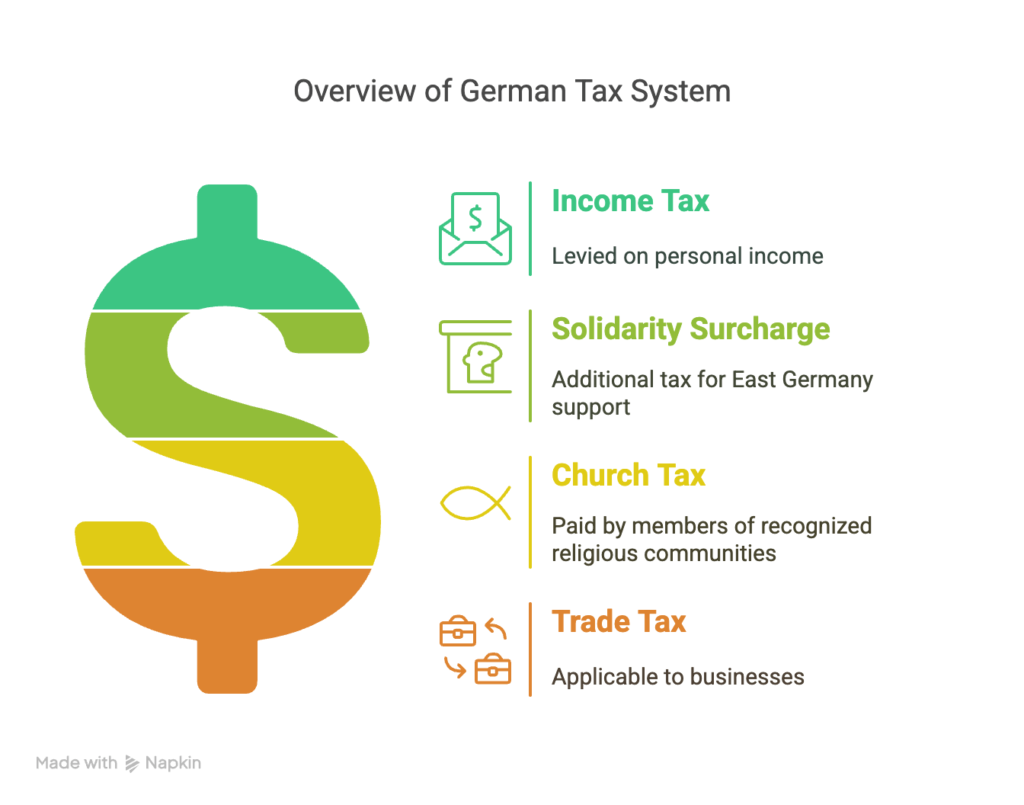Germany has one of the world’s most structured and progressive tax systems. Understanding the Germany Tax Slabs is crucial for expats, freelancers, and employees to ensure compliance and optimize tax savings. This guide will break down the different German tax Slabs, helping you understand how much you will pay based on your income level.
Understanding the German Tax System
Germany follows a progressive tax system, meaning that higher-income earners pay a higher percentage of their Income in taxes. The tax rates apply incrementally, ensuring a fair distribution based on earnings. Additionally, Capital Gains Tax applies to profits from the sale of assets such as real estate and stocks, with rates varying depending on the holding period and asset type.
Key Tax Categories in Germany

- Income Tax (Einkommensteuer) – Levied on personal Income.
- Solidarity Surcharge (Solidaritätszuschlag) – Additional tax to support former East Germany (phased out for lower incomes).
- Church Tax (Kirchensteuer) – Paid by members of recognized religious communities.
- Trade Tax (Gewerbesteuer) – This is Applicable to businesses.
Germany Tax Slabs for 2025

Germany’s income tax system is progressive, with rates increasing as taxable Income rises. For the 2025 tax year, the tax brackets for single taxpayers are structured as follows:
| Taxable Income (€) | Tax Rate (%) |
|---|---|
| Up to 12,096 | 0% (Tax-Free) |
| 12,097 – 68,429 | 14% to 42%* |
| 68,430 – 277,825 | 42% |
| Above 277,825 | 45% |
https://orbitax.com/news/archive.php/German-Individual-Income-Tax-C-57949
*Within the €12,097 to €68,429 range, tax rates increase progressively from 14% to 42%.
Key Changes and Allowances for 2025:
• Basic Personal Income Tax Allowance: The tax-free allowance is set at €12,096 for single taxpayers and €24,192 for married couples filing jointly.
• Child Tax Allowance: The child tax allowance is €9,600 per child.
• Solidarity Surcharge: The solidarity surcharge of 5.5% applies to higher incomes. However, as of January 2021, individuals with an income tax burden of not more than €19,950 (approximately equivalent to a taxable income of €73,463) are exempt from this surcharge. For married couples filing jointly, the exemption applies to those with an income tax burden of not more than €39,900 (approximately equivalent to a taxable income of €146,926).
“These adjustments aim to provide tax relief and account for inflation, ensuring that individuals retain more income.”
Church Tax in Germany
- Applicable to individuals registered as church members.
- Rate: 8% % -9 % of the income tax amount, depending on the federal state.
Tax Deductions and Exemptions
Germany offers several tax deductions to lower your taxable Income:
Common Tax Deductions
- Work-related expenses (Werbungskosten) – Up to €1,230 without needing proof.
- Child Allowance (Kinderfreibetrag) – €8,952 per child for parents.
- Education and Training Costs – Deductible for job-related courses.
- Pension Contributions – These are Tax-deductible to a specific limit.
- Donations and Charity Contributions – Can be deducted from taxable Income.
How Are Taxes Paid in Germany?
- For Employees: Employers deduct Taxes at the source (Pay-As-You-Earn system).
- For Freelancers & Business Owners: Taxes are paid quarterly based on estimated Income.
- Annual Tax Declaration: This is required for freelancers and those claiming deductions.
Important Deadlines
- Yearly tax return deadline: July 31st (if filed independently).
- Extended deadline: April 30th of the following year (if filed via a tax consultant).
Taxation for Expats in Germany
Expats living in Germany must pay income tax if they:
- Stay in Germany for more than 183 days in a year.
- Earn Income from a German source.
Germany has double taxation agreements (DTAs) with many countries to prevent double taxation on the same Income. Check with your country’s tax authority to see if a DTA applies.
Tax Benefits for Families in Germany
- Child Benefit (Kindergeld): Monthly payment per child.
- Parental Leave Benefits (Elterngeld): Financial support for new parents.
- Family Tax Splitting: Couples filing jointly benefit from lower tax rates.
Tax Advisors and Online Filing in Germany
Managing taxes in Germany can be complex. Here are some helpful resources:
Online Tax Filing Service
- ELSTER – Official German tax filing portal.
Hiring a Tax Consultant
Hiring a Steuerberater (tax advisor) can be beneficial for complex cases. Expect fees ranging from €300 to €1,000, depending on the complexity.
Conclusion

Understanding the different tax rates in Germany is essential for managing your money wisely. Whether you’re a worker, a freelancer, or run your own business, knowing how taxes affect your earnings can help you make smarter financial choices. Taking advantage of available tax breaks and getting professional advice can lower your debt. By following the rules and using Germany’s tax system best, you can keep your finances in order while meeting your tax responsibilities.
FAQs
1. Who qualifies for tax-free Income in Germany? The basic tax-free allowance.
Individuals making up to €11,604 annually do not pay any extra.
2. Can I reduce my tax liability in Germany?
You can lower your taxable Income by claiming work-related expenses, education costs, pension contributions, and charitable donations.
3. Do freelancers pay a different tax rate in Germany?
Freelancers pay the same progressive income tax rates as employees but must file taxes quarterly and manage deductions independently.
By understanding the Germany Tax Slabs, you can take control of your finances and ensure you pay the right amount of tax while maximizing available benefits. If you need professional assistance, consult a tax advisor or use an online tax filing service for a hassle-free experience.

